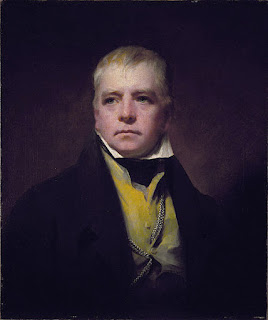It has been said that the famous nineteenth century German historian Leopold von Ranke first turned to the study of history through reading the novels of Sir Walter Scott (see McGarry, White, 1963, p. 17). Therefore right from the inception of historical fiction in novel format the historian and the novelist have, it seems, found themselves intertwined.
Sir Walter Scott (1771-1832) was a Scottish playwright, poet and historical novelist. His first novel Waverley (1814) was followed by Guy Mannering (1815) and The Antiquary (1816) and together formed a trilogy covering Scottish history from the 1740s through to the 1800s. Scott wrote various other novels in his lifetime including Ivanhoe (1820). Ivanhoe was not only a commercial success but can also be said to have played a major role in reigniting general and scholarly interest in the medieval period. Scott also wrote novels based in the fifteenth, sixteenth and seventeenth centuries. During his lifetime Scott wrote at a feverish pace and in general was popular not just in Britain but across the world. Although his popularity can be said to have dwindled nearer the end of his life (and indeed after it) Scott is nevertheless famed for his role in popularising history through the medium of fiction.
In general Waverley can be considered a great success for Scott. Within two days of its publication the first edition had sold out. Critics adored the work, particularly Francis Jeffrey of the Edinburgh Review who viewed its characterisation and vivid descriptions as a means for readers to understand and feel the ‘actual experience’. The now better remembered and regarded Jane Austen wrote somewhat playfully (I think) in September 1814 (less than three months after its publication) that:
“Walter Scott has no business to write novels, especially good ones – it is not fair – He has fame and profit enough as a poet, and should not be taking the bread out of other people’s mouths. I do not like him, and do not mean to like Waverley if I can help it – but fear I must.” (reprinted in Lamont, p. vii)
Despite her somewhat annoyance at the competition Austen recognised the importance of Scott’s approach and Scott himself was to become one of her chief supporters. Although a few critics worried and complained about the mixing of history with romance and fiction this stopped few from enjoying the novel. Indeed this was Scott’s very intention.
On Wednesday I will look further into Waverley and into what it can be claimed was Scott’s unique approach that originated the genre of historical fiction.
Bibliography
David D. McGarry and Sarah Harriman White, Historical Fiction Guide: annotated Chronological, Geographical and topical List of Five Thousand Selected Historical Novels (The Scarecrow Press, Inc: New York, 1963).
Claire Lamont (ed.),
Sir Walter Scott Waverley; or, ‘Tis Sixty Years Since (Oxford University Press: Oxford, New York, 1986).
Bookings are still being taken for the Novel Approaches conference (click here). For information about the virtual conference please click the banner below.


